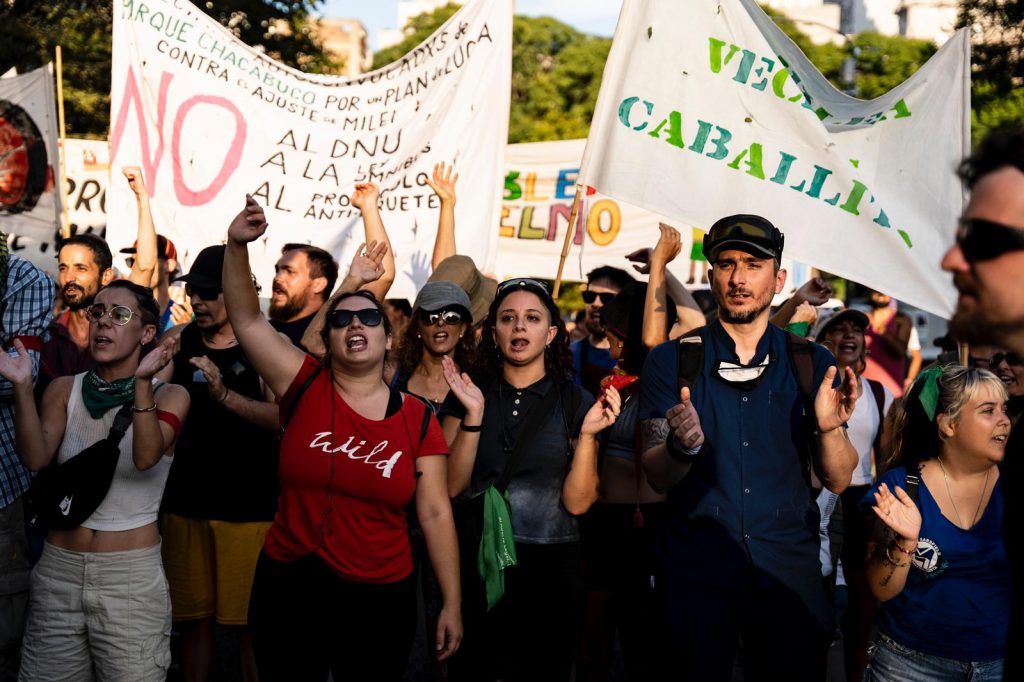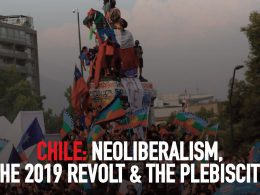By Darragh O’Dwyer
The forces of reaction undoubtedly felt boosted when Javier Milei won Argentina’s presidential elections last November. A self described ‘anarcho-capitalist’, the former TV personality promised to take a proverbial chainsaw to the state sector with a slew of shock privatisations and austerity measures.
Yet 3 months into his presidency and Milei’s all out assault on the masses has unleashed waves of protests and a general strike, just a taste of the major confrontations on the horizon.
Rise of Milei
How did such a figure become the most voted president in Argentine history? Milei is ultimately a product of the economic, social and political crises of capitalism. Like many of the far-right monsters coughed up by the system in the recent period, he relied on anti-elite rhetoric, railing against ‘la casta’ that make up the political establishment. He even cynically donned the slogan “que se vayan todos!” (get rid of them all) — the rallying cry of the Argentinazo — a mass revolt of workers, youth and the oppressed that rocked the South American country in 2001.
Bankruptcy of Peronism
Milei’s main targets were the forces of Peronism. The centre-left reformist government of Alberto Fernandez, elected in 2019, contented itself with managing a decaying Argentinian capitalism and oversaw the complete immiseration of the masses. By the end of his term poverty rates had skyrocketed to 40%; inflation was a jaw-dropping 160% and external debt had ballooned to $400 billion, ($110 billion owed to the IMF alone). Mirroring trends elsewhere, the failure of reformism created a breathing ground for the development for the far-right.
Milei’s Peronist opponent, Sergio Massa, served as minister of economy from 2022 to 2023. He was correctly seen as bearing responsibility for the current turmoil. In fact, a big chunk of the nearly 11.5 million people who voted for Massa did so holding their nose, opting for the lesser evil. While Milei’s most hardened social base is the most reactionary sections of the middle class, he also garnered significant support amongst a layer of workers and youth looking to land a blow against the status quo. Sadly, the lack of a mass left alternative capable of harnessing their rage into an organised struggle against capitalism allowed “El Loco‘’ to step into the vacuum.
Social offensive
Yet Milei’s victory does not represent a total defeat for the working class and oppressed. Rather, Milei’s reactionary social offensive and the stepping up of state repression can be seen as a response to the titanic movements that have shaken the very foundations of Argentine capitalism over the last two decades. After all, Argentina is the birthplace of the heroic ni una menos struggle against macho violence, the first country in Latin America to win marriage equality and the home of the militant marea verde (green tide) that fought tooth and nail to finally win abortion rights in 2020. That’s not to mention the radical piquetero movement of the unemployed and the militant traditions within the workers’ movement.
Not only does Milei want to divert anger away from the real causes of social misery, but by taking aim at abortion rights, slashing support for survivors of gender violence, and launching transphobic tirades against ‘gender ideology’, he wants to discipline and demoralise the most radical sectors of Argentinian society. This in turn would achieve the political preconditions to implement his economic programme.
Contradictions in the ruling class
Nevertheless, Milei faces multiple challenges in consolidating anything resembling stable rule. His party, Libertad Avanza, formed in 2021, only has 38 seats in Congress, forcing him to seek alliances with the traditional right. Presidential candidate Patricia Bullrich, who endorsed Milei after losing to him in the first round, was rewarded with the position of security minister and eagerly leads the crackdown on democratic rights. Luis ‘Toto’ Caputo, finance minister under the loathed right-wing Marcio Macri government, is now minister of economy. That Milei filled his cabinet with much of the traditional ‘casta’ exposed any pretence of ‘anti-establishment’ credentials.
Some sectors of the bourgeoisie were made uncomfortable by the potential instability that Milei’s radical economic policies might provoke. Indeed, to win over the more moderate Caputo, he shelved plans to dollarise the economy, losing the support of his hardline advisors. Likewise, Milei’s decision to pull out of BRICS and pursue a strategic alignment with Washington is a headache for agricultural capitalists who have deepened trade with Brazil and China. On the other hand, the IMF applauded Milei’s measures as “bold” and “far more ambitious”’ than those of his predecessors.
Milei attacks … the masses respond
Sworn in on the 10 December, Milei’s inauguration speech made clear that “there is no possible alternative to austerity.” On 20 December he made good on these promises and moved ahead with his ‘mega decree’ of changes to over 300 laws, implementing attacks on the right to strike, a labour reform and banning of rent controls. He also brought his ‘omnibus’ law to congress, a package consisting of over 600 new pieces of legislation that form part of Milei’s shock austerity plan.
On the same day that Milei announced the decree, the masses immediately responded with a cacerolazo: the banging of pots and pans reverberated throughout the working-class neighbourhoods in Buenos Aires and cities across the country. As the economy continued to spiral, Milei was losing support at a rate of 1% per day. The demand for the CGT trade union federation to call a national strike began to circulate and gain traction. Finally, pressure from below forced the trade union leaders to convoke a one day general strike on 24 January. 1.5 million people took part across the country as workers were joined by piqueteros, feminist groups and neighbourhood assemblies.
First setback for Milei, but the battle continues
Together with continuous protests, the general strike forced the omnibus bill to be dropped. This is a significant first victory against the government but one that must be consolidated as part of an overall battle plan to defeat Milei. Such a movement must be democratically controlled by the rank and file, and not managed from above by the Peronist parties and trade union bureaucracy. In this way, many working-class Milei supporters can be broken from his influence and their genuine anger channelled into a struggle that really takes on the capitalist elite.
The Trotskyist left organised in the Workers’ Left Front — Unity (FIT-U) must provide active leadership — it is not enough to have deputies or to participate in struggle. The crisis of Peronism and the sharpening of the class struggle opens up an opportunity to build a political tool of the left that goes beyond mere electoral unity and that serves to offer a political alternative to the crisis with a socialist programme. This must fight to include not just left activists but also the thousands of people who are active in struggle but outside the ranks of the organised left.
A major opportunity to carry out this task presents itself in these weeks. Following the defeat of the omnibus bill, the attack on abortion rights has been escalated. International Women’s Day will therefore be a crucial day of struggle to resist Milei’s offensive. The feminist assemblies that are being held to prepare for 8M are very large, even involving the participation of some trade unions. But it is necessary for the trade union confederations to call a general strike on 8M to give continuity to the struggle against the government’s austerity measures. ISA Argentina is active in this movement, arguing that this year’s IWD must fulsomely embrace its socialist and working-class traditions as part of the struggle to defeat Milei and the capitalist system that spawned him.












